Students of Asia envisage integrated future at workshop
By Korea HeraldPublished : Aug. 7, 2016 - 18:41
For Bruneian student Noorlela M.D. Yassin, her trip to Korea in early August was an intellectually rocking exercise. An undergraduate at the University of Brunei Darussalam majoring in marine biology, she had long coveted researching microplastic pollution in waters off the coast of her home.
Her aspiration found a dose of inspiration when she participated in the 2016 ASEAN-Korea Youth Network Workshop in Korea last week, an annual program that gathered some 80 university students from 13 countries of the Association of Southeast Asian Nations, China, Korea and Japan for ten days of interactive learning and chumming.
Her aspiration found a dose of inspiration when she participated in the 2016 ASEAN-Korea Youth Network Workshop in Korea last week, an annual program that gathered some 80 university students from 13 countries of the Association of Southeast Asian Nations, China, Korea and Japan for ten days of interactive learning and chumming.
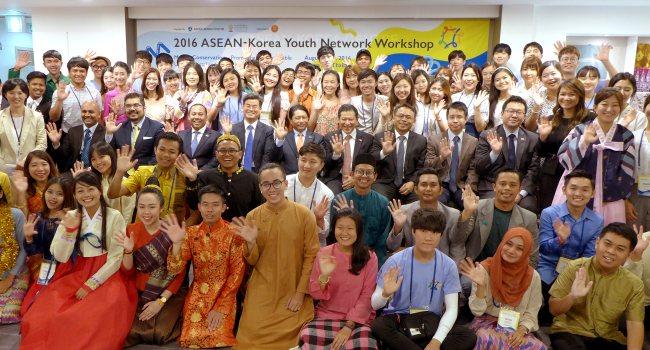
Under the theme of “marine conservation: promoting the sustainable use of coastal and marine resources,” students visited wetlands, coastal areas and maritime institutes and museums, received lectures by experts and even produced awareness-raising videos.
“This workshop has been full of activities, lectures and site visits, which were very informative, interesting and inspiring,” Noorlela told The Korea Herald in an interview last week. “I learned a lot and really admire Korea for what it has achieved in marine biology and conservation. A lecture on protecting marine national parks and restoring indigenous animals here was highly valuable. At the Korean Institute of Ocean Science and Technology South Sea Research Center, we learned about marine debris and microplastic pollution in animals -- my future research passion.”
The way the Korea National Maritime Museum has curated the history of seafaring and over 12,000 maritime relics was laudable, the 25-year-old highlighted, adding that Brunei does not have an equivalent institute.
Brunei, a small sovereign state located on the north coast of the island of Borneo in South China Sea, is surrounded by the Malay state of Sarawak.
“We are bigger than Singapore in terms of land mass, but smaller in population with only 420,000 people,” she noted. “Our most pressing environmental issue is the acidification of estuaries and coastal areas. Due to increasing carbon dioxide from global warming, our waters have become more acidic, and so has our soil. Surface runoff and land erosion bring acidic dirt into streams and rivers, which flow into the sea.”
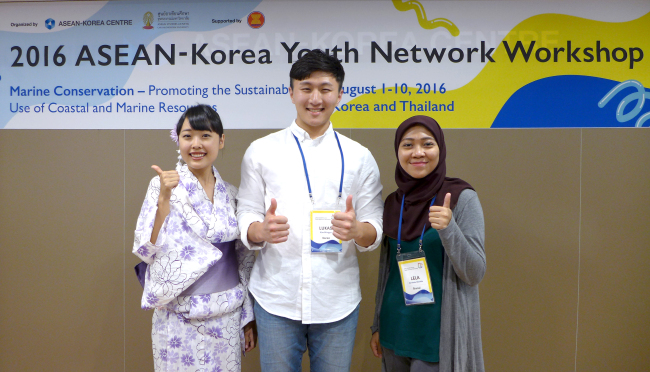
The consequence for the marine life -- particularly “filter feeders” such as clams, mussels, krill and many fish -- is that their lives are being endangered with human implications, Noorlela explained.
“As they have to spend most of their energy fixing their shells, they cannot eat properly and grow,” the student stressed. “The microplastics that swarm in estuaries are filtered by these species and end up in their bodies, which are then consumed by humans.”
Furthermore, in Brunei flooding has become more frequent, with previously safe areas experiencing heavy inundation, she warned. Mangrove forests have been uprooted for infrastructure and residential development.
“We need to protect our forests, but at the same time want to develop our country. It is a dilemma and delicate balancing act.”
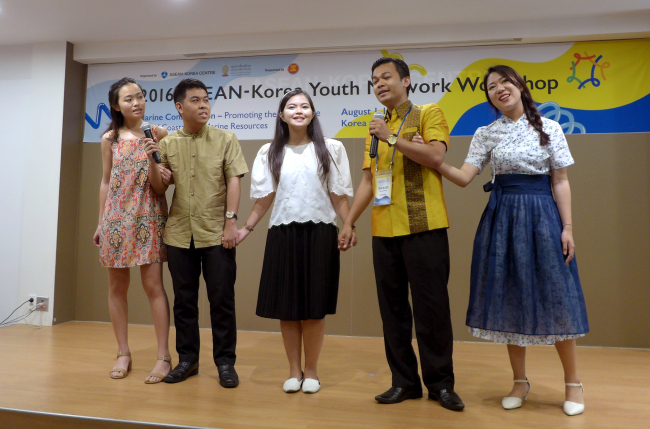
Kim Min-gyu, a Korean student studying kinesiology at the University of Michigan, said participating in the program and mingling with friends from diverse cultures was eye-opening.
“Our team made up of students from the Philippines, Singapore, Laos and Korea had to produce a promotional video. Their different perspectives and attitudes reflected circumstances facing their countries, and we ended up with something that would have been impossible by Korean students only,” the 24-year-old said. “The ASEAN students were very open in their minds and ready to blend ideas with others. They also spoke very good English. If Korean students turned their eyes more toward Southeast Asia, I felt much synergy could be gained.”
Ririka Takahashi, a student majoring in Japanese and Asian studies at the University of Tokyo, said she developed curiosity for Southeast Asia through living in Thailand for over 10 years.
“My family followed my father to Thailand who worked in a car-related industry. I became interested in how Southeast Asia is an emerging market with so many opportunities,” she said.
“Thailand was so different from Japan. I could see a lot of growth potentials. At the same time, I took interest in the more developed countries -- Japan, Korea and China. Although our economies have matured more, we are now at a stage where we have to work so hard for our long-term prosperity. So I thought the three countries, especially Korea and Japan, should develop strong relationships with ASEAN, so that we can all prosper together.”
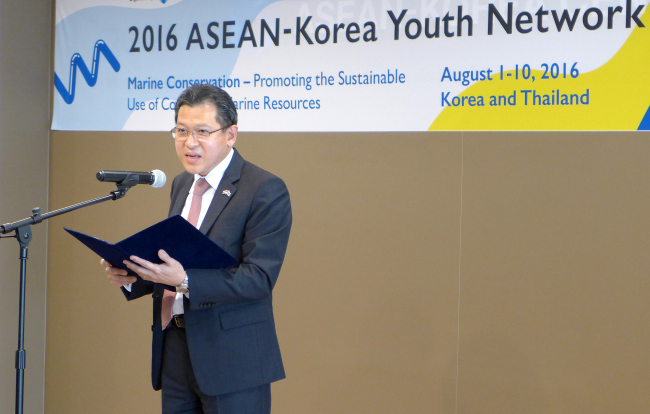
Similar to the European Union, Takahashi argued, Asia as a whole can integrate and leap forward in its diverse cultures and economies.
Noting Japan has few natural resources and energy sources, she said her country has to uncover them from the ocean, for which diplomatic and maritime cooperation is imperative.
“But as you know, international cooperation in the sea is not going so well,” underlined the 20-year-old, referring to Japan’s territorial tug-of-war with China in the Senkaku or Diaoyudao Islands in East China Sea and the ongoing sovereignty clash between China and ASEAN in the South China Sea.
“The science of ocean knows no national boundaries. I learned through the workshop that teamwork is important for not only protecting the environment, but also building peace among countries. We shouldn’t think narrowly about our national interests, but more broadly listen to neighboring narratives.”
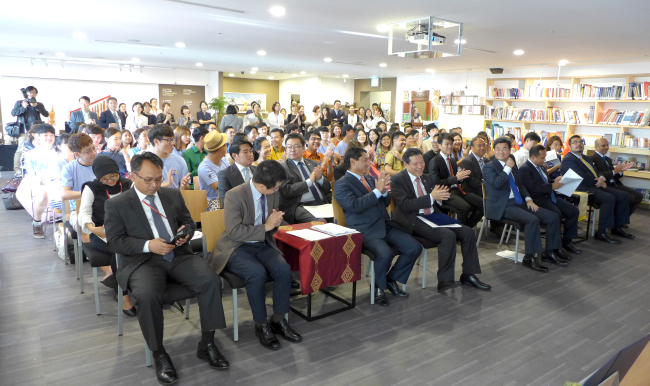
Takahashi pointed out that Southeast Asia has upgraded its human capital and skills toward a knowledge-based economy. Many Japanese firms have made a firm presence in Thailand for automobile, textile and food production, using cheap, unskilled labor, but there are more and more talented and well-educated workers with value-added skills, she added.
“I think we should cooperate with the new generation of engineers, scientists and doctors,” the student suggested. “Japan and Korea have declining populations, our economies are shrinking fast. Therefore cooperating with ASEAN and accepting their skilled labor and immigrants will be necessary. This will strengthen our bonds and develop all our economies.”
Conceding the Japanese society is “insular” and “conservative,” she acknowledged that many people oppose immigration out of fear of forfeiting jobs and havening criminals, calling it a “terrible stereotype.”
“We don’t have enough nurses or staff to take care of the elderly, or information technology experts,” she said. “I consider myself to be in a privileged position, having lived abroad and going to a good university in Japan. Among my friends in the Asian studies major, we are very open to the idea of immigration to combat the many problems Japan is facing.
“Yeah, we have to start changing the minds of the people, I think,” Takahashi added.
By Joel Lee (joel@heraldcorp.com)
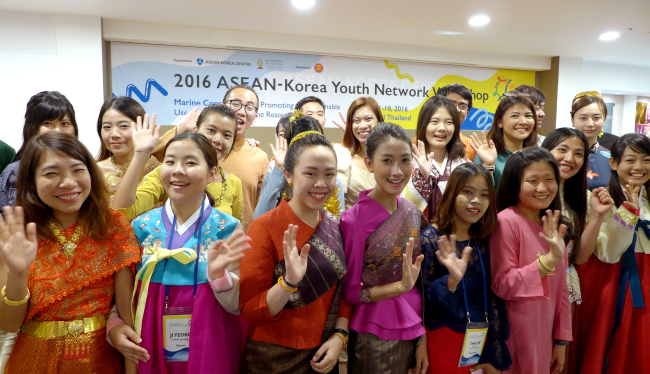
-
Articles by Korea Herald










![[Today’s K-pop] BTS pop-up event to come to Seoul](http://res.heraldm.com/phpwas/restmb_idxmake.php?idx=644&simg=/content/image/2024/04/17/20240417050734_0.jpg&u=)
![[Graphic News] More Koreans say they plan long-distance trips this year](http://res.heraldm.com/phpwas/restmb_idxmake.php?idx=644&simg=/content/image/2024/04/17/20240417050828_0.gif&u=)





![[KH Explains] Hyundai's full hybrid edge to pay off amid slow transition to pure EVs](http://res.heraldm.com/phpwas/restmb_idxmake.php?idx=652&simg=/content/image/2024/04/18/20240418050645_0.jpg&u=20240419100350)

